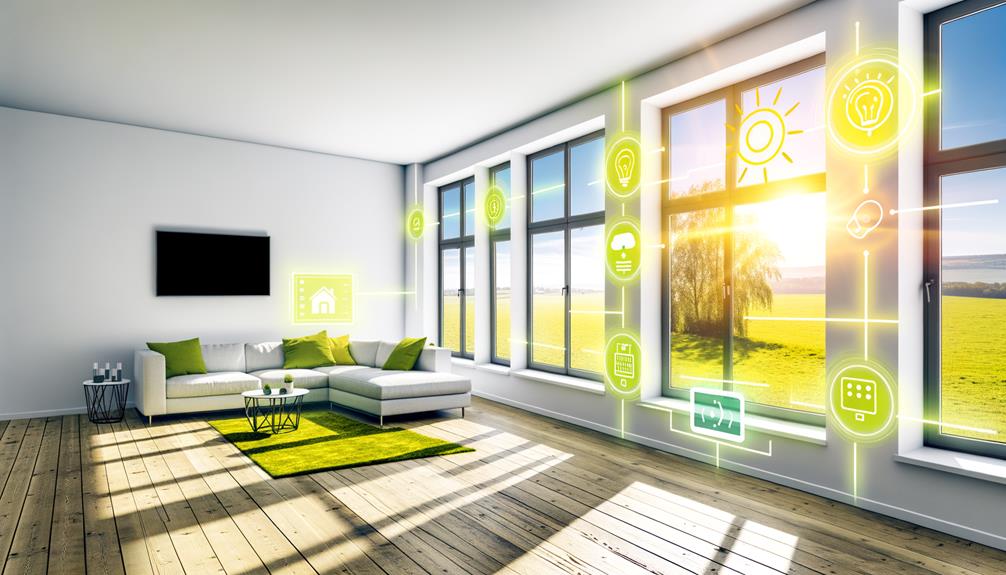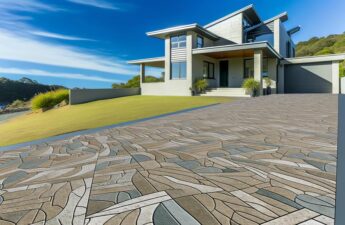So, you think your home is already energy efficient? Well, think again. With the advancements in smart home automation, you can take your energy efficiency to a whole new level.
Imagine a home that knows when you're away and adjusts the temperature accordingly. Or lights that automatically switch off when you leave a room. Sounds intriguing, doesn't it?
In this discussion, we will explore the benefits of smart home automation for energy efficiency and how it can revolutionize the way you manage your energy consumption.
Get ready to discover a world of possibilities that will make you rethink what it means to have an energy-efficient home.
Benefits of Smart Home Automation
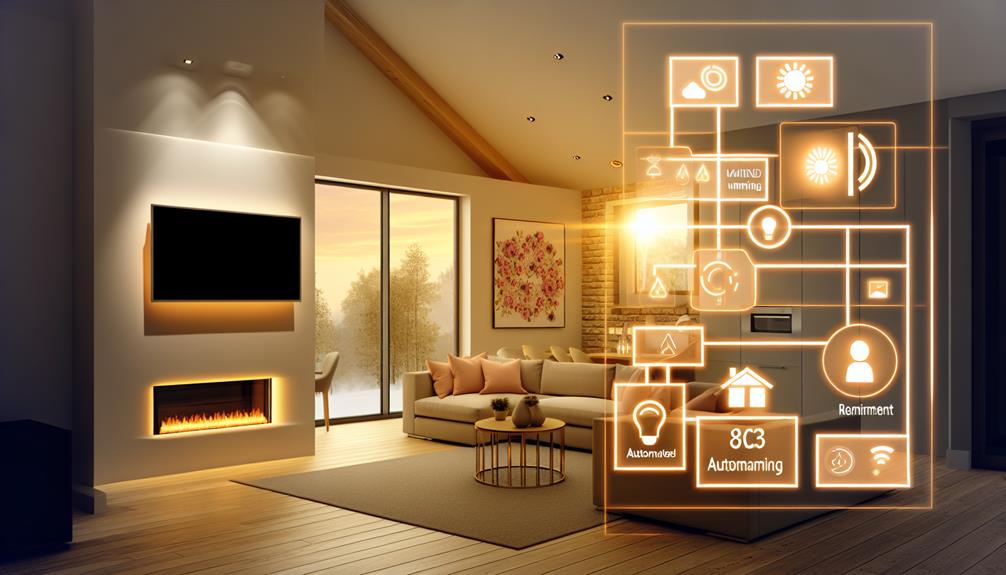
Smart home automation offers numerous benefits. One of these benefits is simplifying energy consumption management. With smart home energy management systems, you can easily monitor and control your energy usage. This can lead to significant energy savings, helping you save both energy and money.
Another area where smart home automation can help you save energy is in managing your heating and cooling system. By installing a smart thermostat, you can easily program and adjust the temperature according to your needs. This ensures that you aren't wasting energy when you aren't at home.
In addition to managing your HVAC system, smart devices such as smart lighting can also contribute to energy savings. These devices can automatically adjust the brightness and turn off when not needed. This further reduces your energy consumption.
Smart Thermostats for Energy Efficiency
Installing a smart thermostat in your home can greatly improve energy efficiency and save you money on utility bills. Smart thermostats are a key component of smart home automation, allowing you to have better control over your home's energy usage. These devices can automatically adjust the temperature based on your preferences and energy needs, even when you're away. By optimizing heating and cooling based on energy usage and outside temperatures, smart thermostats help you save energy without sacrificing comfort.
When choosing a smart thermostat, it's important to look for ENERGY STAR certification. ENERGY STAR certified smart thermostats undergo independent certification for energy savings, ensuring their efficiency. Brands like NEST, ecobee, Carrier/Bryant, and EcoFactor offer different features for energy savings, providing options for different needs.
Automated Lighting Systems
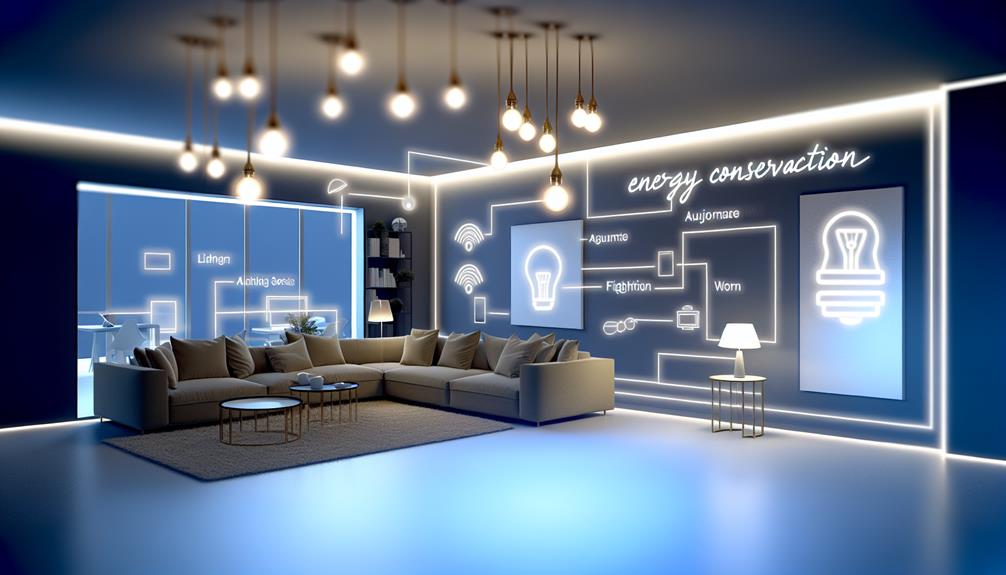
By incorporating automated lighting systems into your smart home automation, you can further enhance energy efficiency and convenience.
Automated lighting systems offer various features that can help you save energy and reduce your carbon footprint. These systems can be programmed to turn on and off automatically, ensuring that lights are only on when needed.
Smart lighting systems, equipped with motion sensors, can also help conserve energy by activating lights only when there's movement in the room. By integrating energy-efficient smart light fixtures and bulbs into your automated lighting system, you can achieve long-term energy savings.
Moreover, with the ability to control your lighting remotely through smartphone apps, you can easily manage and adjust lighting settings from anywhere. This allows you to turn off lights that were accidentally left on, even when you're away from home.
In addition to energy efficiency, automated lighting systems contribute to convenience by enabling scheduling and automation of lighting control. With these smart home systems, you can create personalized lighting scenes and schedules to suit your preferences and lifestyle.
Energy-Saving Smart Appliances
Energy-efficient smart appliances are an integral part of a smart home, providing enhanced performance and energy savings. These appliances are designed to save energy without compromising on convenience or functionality. With smart home automation, you can control and monitor these appliances remotely, allowing you to optimize energy usage and reduce waste. Look for ENERGY STAR certification when purchasing smart appliances to ensure they meet energy efficiency standards.
Smart appliances offer advanced features that contribute to overall energy savings in a smart home. For example, smart sprinkler systems can adjust watering schedules based on weather conditions, saving water and energy. The Nest Learning Thermostat can learn your preferences and automatically adjust the temperature, helping you save money on heating and cooling costs.
In addition to energy savings, smart appliances can also enhance home security. Smart security systems can be integrated with other smart devices, such as cameras and door locks, to provide a comprehensive security solution. Smart water sensors can detect leaks and automatically shut off the water supply, preventing costly water damage.
Maximizing Energy Efficiency With Smart Home Security
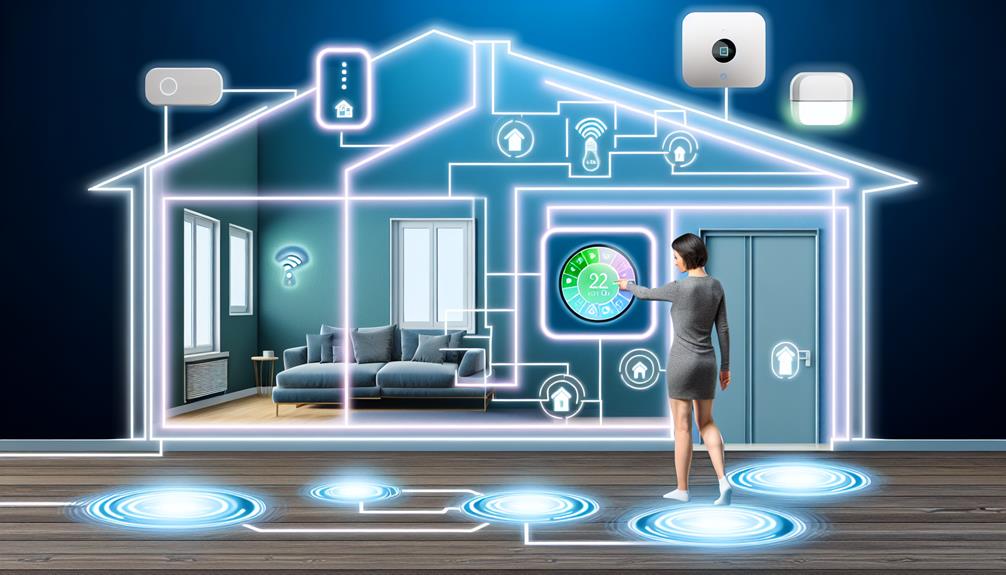
Maximize energy efficiency in your smart home with the integration of smart home security systems. These systems go beyond just keeping your home safe; they can also help you save energy and reduce your environmental impact.
According to the US Energy Information Administration, heating and cooling account for about 48% of the energy used in an average American home. With a smart home security system, you can have better control over your home's temperature, ensuring that energy isn't wasted when no one is home. You can remotely adjust the thermostat or set schedules to optimize temperature control and save energy.
Smart home security systems also allow you to perform actions that can help save energy, such as turning off lights and appliances when they aren't in use. By integrating your security system with other smart home devices, you can create a comprehensive energy-efficient and secure home environment. For example, you can connect your smart security system with smart lighting to automatically turn off lights in unoccupied rooms, reducing energy consumption.
Furthermore, smart home security systems can help prevent water waste, which not only helps the environment but also saves you money on your water bill. By integrating your security system with smart irrigation systems, you can ensure that your lawn and plants are watered efficiently based on weather conditions and soil moisture levels, minimizing water waste.
